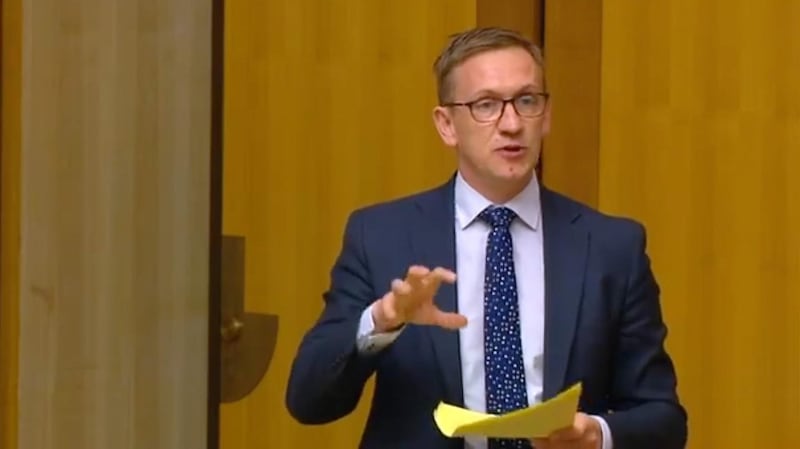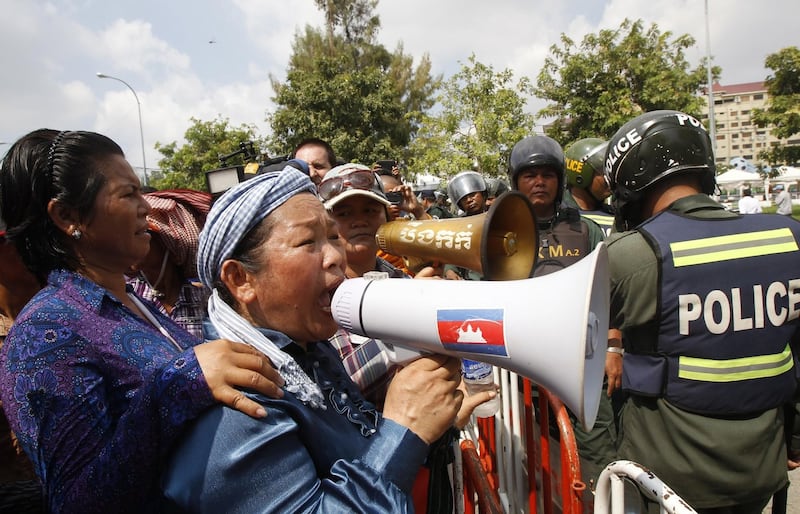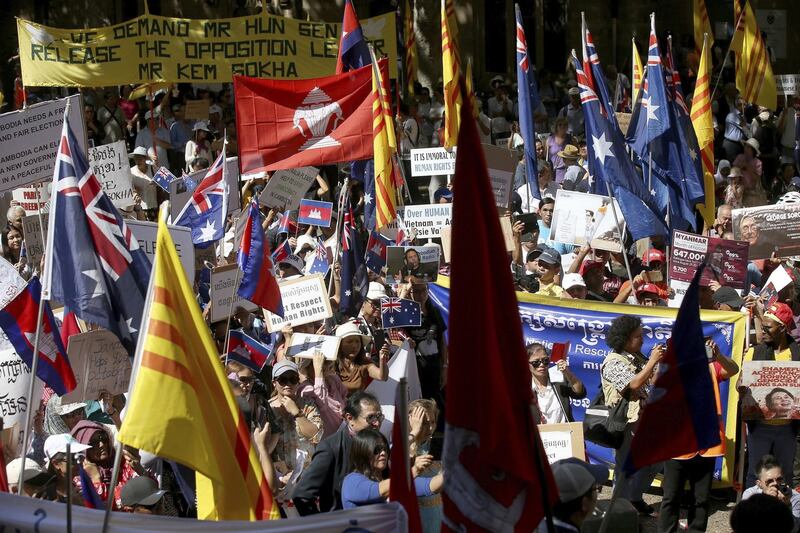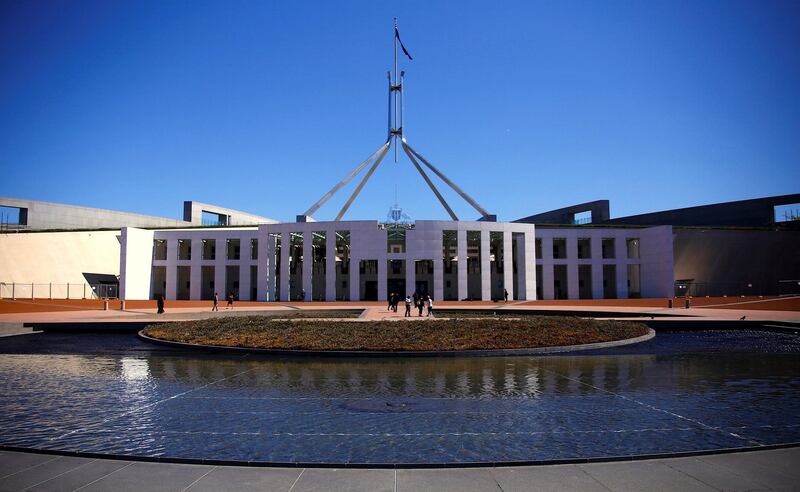A new investigation by RFA out this week explores the multi-million dollar investments made in Australia by Cambodia’s ruling elite over the last five years. These investments appear to have been made in tandem with a campaign of intimidation orchestrated by Prime Minister Hun Sen’s Cambodian People’s Party (CPP) against Australia’s Cambodian community.
On Monday, RFA sat down with Julian Hill, an Australian member of parliament representing the city of Melbourne, home to the highest concentration of Cambodian-born Australians. In the interview, reproduced below, Hill blasted as “pathetic” the Australian government’s response to the millions of dollars flowing from Phnom Penh to cities like Melbourne and Sydney, labelling the Cambodian authorities a “gangster regime.”
The following day, Hill addressed the Federation Chamber of the Australian parliament, where he referenced RFA’s investigation in a speech calling on the Australian government to take a firmer stance with the Cambodian authorities.

The constituency you represent, Melbourne, is home to one of the highest concentrations of Cambodian-born Australians. Over the last five years, the CPP has deployed a mixture of charm and bullying tactics in the hope of stifling dissent among Australia's Cambodian community. What RFA’s latest investigation found is that over the same five years, the CPP’s top families have invested tens of millions of dollars in Australian businesses and real estate, much of it in Melbourne. Do you see a connection between these two trends?
It's of enormous concern to me as someone who loves the Cambodian community and believes in democracy and human rights to really understand more about what's going on. I congratulate you and RFA on the investigative work that you've done to uncover this. I'm deeply concerned, as (opposition party spokesperson) Kem Monovithya said, that Australia has become the number one destination for Cambodia's thugs. And, the Cambodian diaspora tell us, the favorite place for the corrupt elite of Hun Sen’s gangster regime, his family, and cronies to take corrupt money – money gained from human rights [abuses] and invested in Australia. That's an enormous concern.
Like many countries, Australia offers visas to foreign nationals willing to invest in the local economy. What we found is that, over the last five years, wealthy Cambodians invested a total of A$38.5 million ($29.7 million) in support of successful investor visa applications. And while Australia’s Department for Home Affairs insists that all funds and applicants are rigorously vetted, a lot of observers aren't so convinced. Do you think when it comes to authoritarian countries like Cambodia that the Australian immigration authorities need to be doing more to vet the applicants for these visas?
You've raised in your work really important questions. And the question that no doubt concerns millions of Cambodians is, where is this money coming from? The people who are investing this money, if you look at it, they're not paid big salaries by the government. And yet they're able to afford multi-million-dollar apartments and houses and businesses in some of the most expensive suburbs in Australia. It just doesn't add up.
I think the example you gave that the son of Land Management Minister Chea Sophara, in 2016 with his wife, bought an A$11 million ($8.1 million) house in Sydney. And that's just one example. There are many of these. So, it does raise serious concerns about where the money is coming from.
When I was in Cambodia just over a year ago, I met with democracy groups, human rights groups. I sat down with farmers who'd had their land stolen by the government and big corporations. And the consistent message that we got back was that Hun Sen’s government is not treating us fairly. They're not respecting human rights. They've stopped any pretense of having a democracy and democratic norms.
[The people I spoke to] did not want Western countries like Australia to be aiding and abetting these crimes to give a safe haven for these corrupt elites and their children and family to have a lovely life here and buy property using money that's been stolen from ordinary Cambodians.
I believe Australia does need to do more, to make sure that every dollar that comes in the country is not gained from the proceeds of human rights abuses or corruption. To that end, I've been a big supporter of the new Magnitsky laws that the parliamentary committee unanimously recommended should be introduced in Australia, which would give Australia the power to target not countries, but individuals accused of serious or gross human rights violations.
In other countries such as America, there are a number of senior Cambodian generals and some of the corrupt elite that have now been targeted. Which means, [if Australia does the same] that they will never get visas to visit Australia, and they never would be able to take their money out of Australia or bring more money. These are the kind of things which we need to have a serious look at, given the scale of what we understand may be going on.
Late last year, you filed a parliamentary question drawing the Australian Government's attention to pair of investigations by RFA and Al Jazeera linking senior figures in the Cambodian regime to fraudulent investment schemes that were shut down by the Australian financial regulators. Tell me a little bit about what the Australian government's response has been to that question.
I actually got the response only a few days ago, and the response is pathetic. They did not respond in any meaningful way. Frankly, they were like schoolchildren, not government ministers, they went through the questions and they said, “We can't direct the criminal intelligence organization or the organization that looks at money coming into the country… because they're independent.” Well, of course, sure. They can't direct them, but they could have taken the concerns seriously, and even referred them to those bodies. So, it's an incredibly disappointing response. What it shows is that they're not taking these concerns seriously. And that's a great disappointment.
The Magnitsky sanction law is one tool, but we already have anti money-laundering laws. Many of these concerns have been reported by others to the Australian authorities, but I think Australian government ministers need to take these concerns far more seriously. I don't know why the government's avoiding these questions. What have they got to hide?

The city you represent is home to Australia's largest Cambodian community. What impact has this influx of CPP-linked money and political activities over the last half decade had on your constituents?
Over the last five years or so, we have seen reports and heard reports that there's been a much more concerted effort by Hun Sen’s gangster regime and his cronies to infiltrate Australia and to try and shut down dissent in the diaspora. So that's taken a range of forms. I call this foreign interference and Australia introduced a few years ago laws against foreign interference.
I've raised concerns. And, again, I don't think the Australian Government's taking this issue nearly seriously enough. We've seen reports of intimidation, actual threats against people in Australia, Australian citizens who speak up for democracy and human rights in Cambodia, concerns about the safety of their family and friends in who live in Cambodia.
We've seen a very deliberate effort by the CPP, Hun Sen’s political party. This is the party that won 125 seats out of 125 seats in the election. I mean, it's a joke, it wasn't a democratic election. We've seen that political party now set up chapters in every state and territory in Australia. Each of these chapters is headed by a senior general or one of the operatives in the Hun Sen regime. Their purpose is not benign. Their purpose is to put pressure on activists and outspoken people in Australia to shut dissent down to stop people criticizing what's going on in Cambodia from Australia.
The latest tactic, which I'm deeply concerned about, and I'll be speaking again in the parliament about, is that Hun Sen's now started these mass trials of hundreds of people who don't live in Cambodia. Many of them have not been to Cambodia for years or decades. But what they've done, their so-called crime, is to speak up publicly, be it in Australia, or Canada, or the U.S. or Europe, or other countries. To speak up and say what's happening in Cambodia is not good. The government is stealing money from people, the government is taking people's land, the government is not respecting human rights.
And apparently now, in Hun Sen’s world, someone in Australia saying these truths is now (committing) a crime because they're creating dissent. And so, I think this is a terrible new tactic, and the Australian government needs to also push back on it. Our ambassador has raised these concerns with the Cambodian minister for justice, but we need stronger action. This is completely unacceptable, that citizens in democracies around the world will be threatened by this gangster simply for speaking up in support of democracy and human rights, common human values.
[Note: Proceedings in a Phnom Penh court commenced in mid-January against 59 former opposition Cambodia National Rescue Party (CNRP) lawmakers and activists. Theirs were the first mass trials of some 136 defendants over their alleged involvement in acting party president Sam Rainsy’s attempt to return to Cambodia in 2019. International observers have described the trials as politically motivated and called on the government to drop them.]

The impression I get from speaking to you, is that the CPP’s activities in Australia and in Cambodia, as they relate to Australian citizens, are effectively curtailing the fundamental civic rights of Australian citizens. And I'm just wondering, I know you said that you're not sure why the Australian government seems so reluctant to take a firmer stance on these issues. But, do you have any idea as to why it might be that they're so reluctant?
Well, you’re absolutely right. I mean, these are issues that go to our democratic rights and freedoms in Australia and the freedom of speech rights that any Australian citizen – whatever their cultural, ethnic or religious background – that anyone who is an Australian citizen living here in Australia can express their mind. They can say what they want, within reason. They can't incite violence, but they can pretty much speak their mind. I don't agree with everything that people say to me; but it's a free country, as we say. That's a good thing. I don't understand why the Australian Government is not speaking up more in support of people's rights here in Australia.
There was one reason and it was in place for some years. Our current Prime Minister Scott Morrison is not a man that I like or support, but he's the prime minister. He was originally the immigration minister. He was seen in Cambodia, drinking champagne with Hun Sen and his generals and cronies, when he signed an appalling refugee deal in which Australia gave Cambodia some tens of millions of dollars, in return for Cambodia taking a few refugees. I think only three or four people went there in the end, it was a ridiculous arrangement. Now, that made a political constraint for some years on Scott Morrison from speaking out, but that deal is no more, it's gone. So, that constraint’s not there.
I do not understand why the Australian government is so weak, so shameful, so silent. But, myself and other Labor members of parliament – and, I would hope, decent members of the government – would expect that the Australian government, whatever their politics … to defend and protect the rights of Australian citizens to speak their mind to speak up for Australian values here in Australia.
One of the people charged is a guy called Hong Lim, who's a friend of mine. He was a state member of parliament. He's of Cambodian descent. I think he was the first Cambodian-born person to be elected to parliament in a Western democracy anywhere in the world. For 20 years he served with distinction, and he's been charged by Hun Sen’s regime simply for speaking up for democracy and human rights. So, on that basis, I could receive a criminal charge from Hun Sen, so could just about any member of the Australian parliament. It can happen in the U.K., anywhere around the world, and it's not acceptable.
This interview has been edited for clarity.


